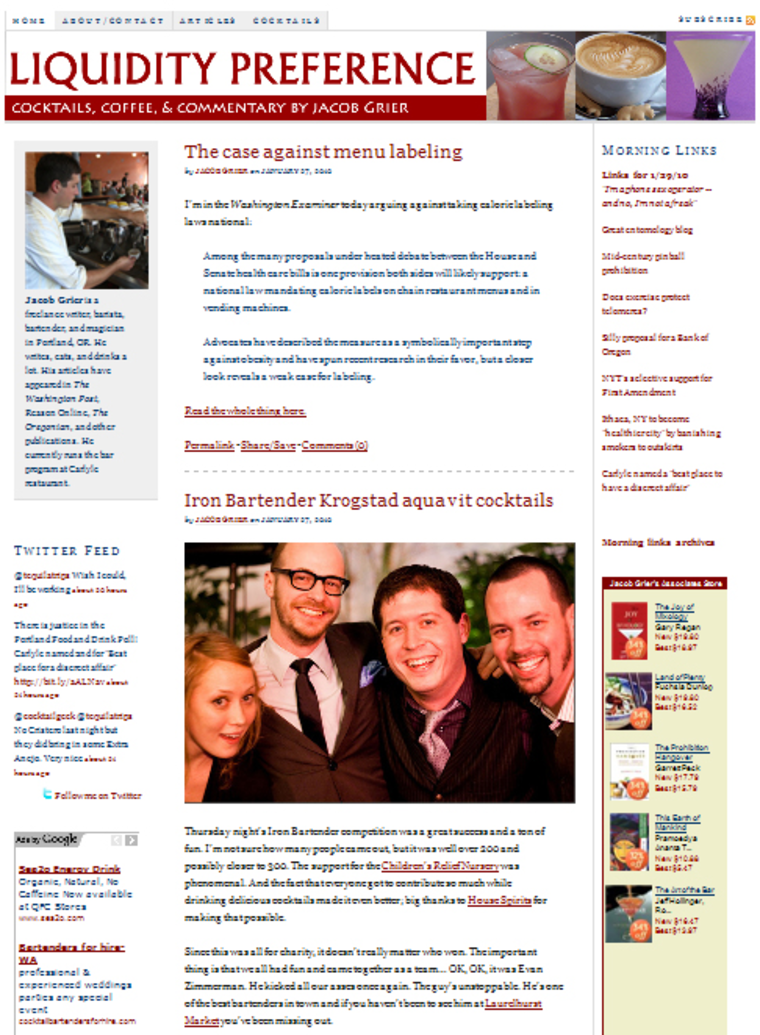If you’re looking to land a job out of college, enhance your career or find a new one, maybe you’re thinking about jumping on the blogging bandwagon.
But do you really need blogger on your résumé?
“No one has to have a blog,” said Allen Johnston, a social media professor at the University of Alabama at Birmingham, School of Business.
“It can be purposeful if it’s professional, well thought out and intelligent,” he said. “But it’s a different thing if you just ramble without a strategic plan. You’re opening yourself up to disaster.”
Blogs, or Web logs used to share opinions and ideas with the world via the Internet, have taken off in the past decade. There were 126 million blogs on the Internet as of January, according to BlogPulse, a division of ratings firm Nielsen that tracks blogs.
For those who are decent writers, have something to share that’s related to their profession or passion, and have time to commit to posting frequent entries, blogging can be a great tool. (Full disclosure: I blog about labor and workplace issues on CareerDiva.net.) For the rest, it may be best to sit on the blogosphere bench.
The key is figuring out if a blog will really help your career aspirations or not.
Demonstrating expertise
For mixologist Jacob Grier, his blog “Liquidity Preference” helped him land a primo bartender job at the Carlyle Restaurant in Portland, Ore.

Grier started blogging about making unusual cocktails two years ago as an outlet for his love of food and drinks. While working for a bar in Washington, D.C., he decided to move to Portland because of the culinary scene.
Thanks to the blog, he had already connected with two well-known mixologists in Portland. Those contacts ended up taking him to an industry event where Grier met the bar manager at the Carlyle, and the rest is history.
“Even during interviewing at the restaurant, the fact that I had the blog helped me prove myself,” he said, because he was able to showcase his passion for cocktails and his expertise.
But like everything in this recession, nothing is definite. Grier just found out his restaurant is closing in two weeks because of the tough economy for high-end dining, but he hopes his blog will land him land yet another job.
Watch what you say
However, blogging didn’t work out so great for Kelly Dunleavy of San Rafael, Calif.
The summer after she graduated from University of California, Berkeley, she started a blog that she described as “fun”. “As a writer,” she said, “I thought it would be helpful to show potential employers that I could write.”
Dunleavy, who’s now a reporter for a newspaper in Marin County, was interning at the governor’s office when she was writing the blog and was considering accepting a full-time job there.
“I mused briefly on my blog about the odd-flavor of the office, the lack of windows, the 24-hour news cycle, and about whether this was really the bizarro atmosphere for me. I did not write anything bad about anyone else or about the governor or about, well, anything,” she said.
Unfortunately, her blog post was enough to get her future bosses up in arms, and they promptly rescinded the offer.
“I was shocked, because I know the Internet is public and I know that you have to be careful what you put out there to the public, but I had no idea this would cause concern for anyone,” she added.
Red flags
Clearly, one of the biggest problems a blogger faces is how prospective or current employers perceive what she or he says on a blog.
Maybe you took a political stance a hiring manager didn’t agree with or simply wrote something that made you sound dumb. Bloggers beware: There are few, if any, protections for workers if an employer fires you or refuses to hire you for something you wrote on a blog outside of work.
“It’s the bright, shiny object theory,” said Maureen Crawford Hentz, the U.S. manager of talent acquisition for Sylvania in Danvers, Mass., responsible for hiring everyone from light bulb changers to engineers. “People think, ‘People are blogging. I should have a blog.’”
Personal blogs don’t impact her hiring or interviewing decisions unless there’s a red flag, she said. “If I see someone making ridiculous, stupid or inflammatory comments on a blog, it would make me not want to move forward.”
On the other hand, professional blogs that focus on the industry, that are done well and show a passion are indeed a plus, she added. But that’s only if the blogger posts regularly, provides well-researched information, and the blog isn’t riddled with spelling or punctuation mistakes, she said.
Crawford Hentz suggested that most people just comment on existing industry blogs as a way to gain exposure without having to make a serious blogging commitment.
Career advantages
But for those who have the time to commit to a blog, there can be definite career advantages.
J Wolfgang Goerlich, the network operations and security manager for a Michigan financial firm, believes his blog “J Wolfgang Goerlich's Thoughts on Information Security” has helped his career.
“Sharing what I learn along the way helps those in my field, helps cement my knowledge, and builds my reputation,” he said.
And Michael Smith, a school superintendent in Oakland, Ill., believes his blog — “Michael Smith’s Principals Page” — showcases his passion for education and has helped enhance his “personal brand.”
“Being one of the first superintendents to blog in the way I do has also allowed me to set myself apart from other administrators,” he said. “In the future, I think this will offer me the opportunity to speak, present, etc.”
Again, it all depends on how much time you can commit.
“If you’re going to strategically leverage a blog to find a job, then you need to blog about the industry or job you want to get hired into,” said David Perry, co-author of "Guerrilla Marketing for Job Hunters.”
“You blog to get noticed, to be found, to create demand, to be considered an expert,” he said, adding that the goal is ensuring “an employer calls you rather than the other way around.”
But in order to be found, you need a strong, consistent following of readers — and clicks from those readers — for search engines on the Internet to rank you high enough so that people searching for experts in a field will come upon your blog, especially if your industry if fairly large.
Setting yourself apart
J.T. O'Donnell, a workplace consultant and author of “CareerRealism: The Smart Approach to a Satisfying Career,” is a big advocate of blogging, even for those currently happy with their jobs. “None of us will have only one career in our lifetime,” she said.
“To assume we don't need a blog for a particular career we are in now is short-sighted and could hurt us in the long-run,” she added.
But before you jump in, O'Donnell suggested that you ask yourself what knowledge have you gained that has made you better at your job. “By sharing this in a blog, even a Twitter feed so you are simply micro-blogging, you are creating a brand that showcases who you are as a worker. You are letting employers inside your head — and that is vital,” she said.
Heather Huhman, president of Come Recommended, an online community for entry-level job seekers, is also a big cheerleader of blogs as a career booster — provided you have the time and motivation to make it worth your while.
“Are they absolutely required? Of course not,” she said. “But I think they can be helpful these days and help you set yourself apart.”
